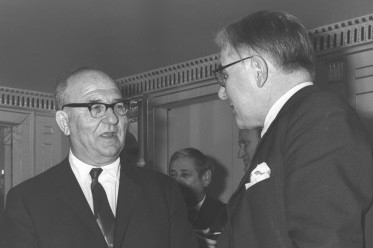
April 5, 1974
Richard Crossman, a British career politician, known for being a convert to Zionism passes away at his home in England after suffering from liver cancer. Crossman is 66. Initially in his professional engagement with the Palestine issue, he sympathizes with the Arabs; however, he ends up becoming a strong supporter of Zionism in 1946. From then on, he staunchly advocates for Zionist ideals in the British Parliament. Among the many appointments Crossman held during his time as a public servant in Britain, he serves on the Anglo-American Palestine Commission.
The commission came about at a time when the US and Great Britain were at odds about whether Palestine should be a destination for Jews who survived WWII and the Holocaust. The release of the Harrison Report in the United States in August 1945 leads President Harry S. Truman to call for Jewish refugees in Displaced Person Camps to be allowed into Palestine. Great Britain, however, balks and instead recommends setting up the special joint commission.
The Anglo-American commission recommends that 100,000 Jews be allowed into Palestine despite the restrictions on immigration which have been in place since the 1939 White Paper. President Truman endorses the idea but Earnest Bevin, the British Foreign Minister, states that Truman’s support was only because the “US did not want too many (Jews) in New York!” Britain, ignoring the recommendations of the report, only opens the doors of Palestine to 1,500 Jews per month. Diplomatic relations between London and Washington are subsequently strained.
Through Crossman’s experiences on the Commission he comes in contact with many Zionist leaders, including Chaim Weizmann, who have a strong influence on him changing his views towards the development of a Jewish state in Palestine. Crossman later engages in a public and heated feud with Bevin over this issue. In his 1960 book A Nation Reborn, Crossman states, “What stuck in my gullet was the idea that British troops should be used to hold the Arabs down while the Jews were given time to create an artificial Jewish majority. Sure enough, I did at last come to the conclusion that the injustice done to the Arabs by dividing the country and permitting the Jews to achieve a majority in their portion would be less than the injustice done to the Jews by implementing the 1939 White Paper. But this was a complicated, terribly difficult decision to reach.”
